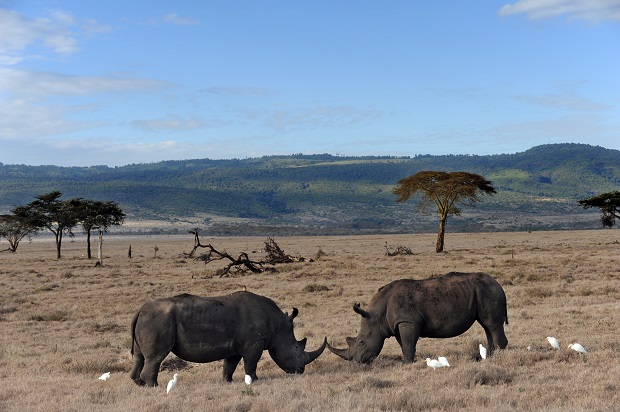Could legalising the trade in rhino horn – and allowing sport hunting – be the solution to Africa’s rhino poaching problem? Legalisation, it is argued, will make it easier to control the trade in animal products and negate the black market. It’s a similar argument to one often used about the legalisation of marijuana – as Hugo Rifkind wrote a couple of weeks ago:
‘This is an economic land grab. It is the process of taking a criminal industry away from criminals.’
Controlling a legal trade in animal products is easier said than done, however. Authorities have struggled to suppress the illegal trade, so there are doubts about whether they can regulate a legal one. The economics are uncertain, too. Flooding the market with legal rhino horn would increase its availability, thereby decreasing its value. But, even if that were to happen, there might not be enough rhino horn in the world to meet growing demand. The use of rhino horn as a medicine is a status symbol in many parts of Asia, where the number of people able to afford the product is rising rapidly.
Raising rhinos in parks and using them for sport hunting is one suggestion; then, at least, a rhino has a price on its back as well as its horn. That argument might work if poachers could make more money from regulated sport hunting than they do from poaching; but rhino horn sells for around £40,000 per kilo at the moment. The Dallas Safari Club, who controversially auctioned off a permit to hunt a black rhino earlier this month, sold that license for £214,000. If we can assume that is the top end of the rhino hunting market (the auction was, after all, well publicised in the media), then the figures don’t quite add up. Each rhino has two horns; the average weight of a pair of black rhino horns is 2.5kg (£100,000-worth of horn), but the larger white rhino horns weigh an average of 6kg, at a price of £240,000. Factor in the fact that breeding rhinos for hunting would come at a price – including the running of the game reserve and paying for their protection – and it’s hard to see how sport hunting would be a viable option.
The man who bought the permit auctioned in Texas – one of five black rhino hunting permits issued by Namibia annually – describes himself as a ‘conservationist’. The permits enable the Namibian government to target the black rhino that are shot; these are normally the older bull rhinos that can no longer breed and could be a threat to the younger, healthier males. In the majority of species – as with deer in the UK – this kind of culling tends to be the most sensible way of managing a population. But the global black rhino population stands at around 5,000, so it’s much harder to justify culls.
As with most things in life, money is the problem. If rhino horn were to lose its value entirely, poaching would stop. Conservation is a matter of educating the people who buy rhino horn: mainly the Vietnamese, but also the Chinese and many other Asian countries. Actors Bai Ling and Jackie Chan are among the Asian celebrities who have been enlisted to fight for the rhino, as has the basketball player Yao Ming. But unless demand is stopped, it’s hard to see poaching coming to an end.







Comments